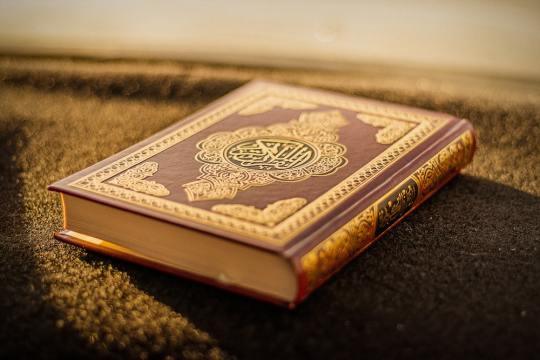#Al-Qasas
Text
ولا تدع مع الله إلها آخر لا إله إلا هو كل شيء هالك إلا وجهه له الحكم وإليه ترجعون - القصص ٨٨ - الشيخ سعود الشريم - صلاة الفجر - الحرم المكي - ٦ محرم ١٤٤٤
#Quran#Al-Qasas#Al-Qasas 88#ولا تدع مع الله إلها آخر لا إله إلا هو كل شيء هالك إلا وجهه له الحكم وإليه ترجعون#Saud Al-Shuraim#Makkah#قرآن كريم#قرآن#سورة القصص#القصص#القصص ٨٨#الشيخ سعود الشريم#سعود الشريم#صلاة الفجر#٦ محرم ١٤٤٤#الحرم المكي#مكة المكرمة#مكة#صالح بدرة#صالح بدره#Saleh Badrah#Islam#Islamiyatsb
7 notes
·
View notes
Photo

Search, Read, Listen, Download and Share #Surah #Al-Qasas [28] @ https://quranindex.info/surah/al-qasas #Quran #Islam
0 notes
Text
14 notes
·
View notes
Text
I watched this video the other day by Nouman Ali Khan. He was talking about ayah 28:25 in which there's the mention of one of the girls who walked towards him shyly & asked him to come to her house as her father has invited him for rewarding him for his help.
The ayah roughly translates as:
Then one of the two women came to him walking with shyness. She said, "Indeed, my father invites you that he may reward you for having watered for us." So when he came to him and related to him the story, he said, "Fear not. You have escaped from the wrongdoing people."
NAK says that there are these effects a woman has on her surroundings. Her presence is acknowledged everywhere she goes. This was the effect, the girl talked about in the ayah above was aware of which is why she walked shyly keeping an eye on her modesty towards Moses (AS).
NAK also mentioned that a woman could be shy & confident at the same time. In fact, she should be shy but confident enough to stand up for herself!
11 notes
·
View notes
Text
Surah Al-Qasas English Translation,Transliteration Tafsir [1-10]

Surah Al-Qasas: The 28th chapter of the Holy Quran
Welcome to our blog post on Surah Al-Qasas, the 28th chapter of the Holy Quran! In this captivating journey through divine wisdom, we delve into a chapter that not only tells mesmerizing stories but also imparts profound life lessons. From Moses' miraculous escape from Pharaoh's clutches to the unforgettable encounter between Musa and Khidr, Surah Al-Qasas is an enchanting exploration of faith, resilience, and the boundless mercy of Allah. Join us as we unravel its verses and unlock hidden treasures that will leave you inspired and in awe of the timeless beauty found within these sacred pages. So sit back, relax, and let us embark on this spiritual adventure together!
Benefits of Reciting Surah Qasas
Surah Qasas, the 28th chapter of the Holy Quran, is a powerful and significant surah that holds many benefits for those who recite it. This surah encompasses a variety of themes and lessons, making it relevant to our lives in various ways. From stories of past prophets to guidance on how to deal with life's difficulties, Surah Qasas offers a wealth of wisdom and blessings for believers.
Here are some key benefits that can be attained through reciting Surah Qasas:
1. Strengthens Faith:
One of the most significant benefits of reciting Surah Qasas is that it strengthens one's faith and belief in Allah (SWT). Through this surah, we learn about the power and mercy of Allah (SWT) through His divine intervention in the lives of His prophets. The stories mentioned in this surah serve as reminders that no matter how difficult our circumstances may seem, Allah (SWT) has a plan for us and will guide us through our trials just as He did for those before us.
2. Guidance during Difficult Times:
Surah Qasas contains many stories of struggle and hardship faced by past prophets such as Musa (AS), Yusuf (AS), and Harun (AS). These narratives offer valuable lessons on how to deal with challenging situations with patience, reliance on Allah (SWT), and trust in His plans. Reciting this surah during times of difficulty can provide comfort and strengthen our
Surah Al-Qasas English Translation and Transliteration
Surah Al-Qasas is the 28th chapter of the Holy Quran, and it is a beautifully crafted surah that holds great significance in Islam. The name "Al-Qasas" translates to "The Narrations", which refers to the numerous stories mentioned in this surah.
This surah is divided into 88 verses and was revealed in Mecca during the early stages of Prophet Muhammad's (peace be upon him) prophethood. It is believed that this surah was revealed as a response to the disbelievers who challenged Prophet Muhammad (peace be upon him) to bring forth miracles from Allah.
1. Purpose and Themes of Surah Al-Qasas:
The primary purpose of this surah is to provide guidance and strengthen the faith of believers by narrating stories from past prophets and their struggles against disbelief and oppression. It also serves as a reminder for mankind about the consequences of rejecting faith in Allah.
One of the main themes of Surah Al-Qasas is Tawheed (oneness of Allah). It emphasizes on how all prophets, including Moses, Abraham, Joseph, and others, preached tawheed among their people despite facing challenges and persecution.
Another important theme is taqwa (God-consciousness), which is repeatedly mentioned throughout the surah. The story of Prophet Moses serves as an example for believers to have trust in Allah's plans even when faced with difficulties.
Surah Al-Qasas Tafseer Ibn-Kathir
1. Surah Al-Qasas Tafseer Ibn-Kathir: Exploring the Stories of Prophet Musa and Fir'aun
Surah Al-Qasas, also known as "The Stories", is the 28th chapter of the Holy Quran. This surah contains 88 verses and is named after the numerous stories that are mentioned within it. One of the most famous stories in this surah is that of Prophet Musa (Moses) and Fir'aun (Pharaoh). In this section, we will delve into the tafseer (exegesis) of Surah Al-Qasas according to Ibn-Kathir.
1.1 Background
Before we dive into the tafseer of Surah Al-Qasas, it is important to understand its context. This surah was revealed in Mecca during a time when Muslims were facing persecution from their enemies. The disbelievers would often mock them for not having any significant historical figures or stories in their religion like other nations did.
Therefore, Allah revealed Surah Al-Qasas to not only comfort and strengthen the believers but also to show them that they do have great prophets and powerful stories in their religion.
1.2 The Story of Prophet Musa and Fir'aun
The majority of Surah Al-Qasas is dedicated to telling the story of Prophet Musa and Fir'aun. It begins with how Musa was saved by Allah's decree when he was
Surah Al-Qasas read at Quran4ever.com
Surah Al-Qasas, also known as "The Stories," is the twenty-eighth chapter of the Holy Quran. It is a Makkan surah, meaning it was revealed to Prophet Muhammad (peace be upon him) during his early years in Mecca. This surah consists of 88 verses and is named after the story of Prophet Musa (Moses), which is mentioned in detail.
At Quran4ever.com, we strive to provide our readers with authentic and comprehensive resources for understanding the Quran. That's why Surah Al-Qasas holds a special place on our website, as its significance and message are crucial for every Muslim.
The main theme of Surah Al-Qasas revolves around the concept of trials and tribulations that believers face in their lives. Through various stories from different prophets, Allah (SWT) teaches us valuable lessons about patience, trust in Him, and ultimate success through faith.
The surah begins with an introduction to Pharaoh's tyrannical rule over Egypt and how he oppressed the Children of Israel. We learn about Musa's birth and miraculous escape from Pharaoh's decree to kill all newborn boys among his people. The story continues with Musa growing up under Pharaoh's care until he kills an Egyptian man who was beating one of his brethren from Israel. This incident forces Musa to flee Egypt and seek refuge in Midian.
In Midian, Musa meets Prophet Shuaib (Jethro), marries
Summary
The 28th chapter of the Holy Quran, Surah Al-Qasas, is a beautifully written and powerful chapter that holds deep significance for Muslims all around the world. Composed of 88 verses, it was revealed in Mecca during the early years of Islam.
The name “Al-Qasas” translates to “The Stories”, and this chapter certainly lives up to its name by containing numerous stories of past prophets and their struggles. It also delves into themes such as faith, patience, and divine guidance.
One of the main themes of Surah Al-Qasas is that of trials and tribulations faced by prophets and believers alike. The story of Prophet Musa (Moses) is recounted in detail, highlighting his journey from being raised in Pharaoh’s palace to his eventual mission as a messenger of God. The story serves as an inspiration for believers to never lose hope and trust in Allah during times of hardship.
Another prominent theme in this chapter is that of divine guidance. Throughout history, Allah has sent messengers to guide humanity towards the right path. In Surah Al-Qasas, we see how these messengers were chosen by Allah to fulfill His purpose on earth. This serves as a reminder for us to seek guidance from Him through prayer and following His commandments.
Surah Al-Qasas also emphasizes the importance of having sincere faith in Allah alone. The story of Prophet Musa’s mother placing her baby son in a basket on the Nile River reflects
#verses 1 to 10 from surah al-qasas#surah al qasas verse 1 to 10#surah al qasas 1-10#surah al qasas ayat 1-10#quran ayat about sky#surah waqiah english translation#surah kafirun in english#surah al-qasas verse 1 to 10#surah baqarah transliteration#quranic#al quran#holy quran#quran#quran or hadiths#quranquotes
3 notes
·
View notes
Photo

"قَالَ رَبِّ إِنِّي ظَلَمْتُ نَفْسِي فَاغْفِرْ لِي فَغَفَرَ لَهُ إِنَّهُ هُوَ الْغَفُورُ الرَّحِيمُ"
.
Quran. Surah 28 Al-Qasas, verse 16.
.
.
https://t.me/Qurantion/707
#لا اله الا الله#محمد رسول الله#اسلام#قرآن#سنة#Ислам#Коран#Сунна#Islam#Quran#Sunnah#سورة_القصص#سورة القصص#Surah 28 Al-Qasas#сура Аль-Касас#شهر رمضان#رمضان#رمضان ١٤٤٤#رمضان ٢٠٢٣#رمضان 1444#رمضان 2023#Ramadhan#Ramadan#Ramadan 1444#Ramadan 2023#Рамадан#месяц Рамадан#Рамадан 1444#Рамадан 2023#صدقة جارية
7 notes
·
View notes
Text
رَبِّ إِنِّي لِمَا أَنْزَلْتَ إِلَيَّ مِنْ خَيْرٍ فَقِيرٌ
Rabbi inni lima anzalta illayya min khayrin faqir
My Lord! Truly, I am in need of whatever good that You bestow on me!
7 notes
·
View notes
Text
One of the women, walking bashfully, came to Moses and said, "My father calls you and wants to pay you for your watering our flocks." When Moses came to the woman's father and told him his whole story, he said, "Do not be afraid. Now you are secure from the unjust people."
0 notes
Photo

(via القرآن الكريم سورة القصص - Al-Quran Al-Karim Surat Al-Qasas)
0 notes
Text
ولا تدع مع الله إلها آخر لا إله إلا هو كل شيء هالك إلا وجهه له الحكم وإليه ترجعون - القصص ٨٨ - الشيخ سعود الشريم - صلاة الفجر - الحرم المكي - ٢٤ جمادي الأول ١٤٢٨
#Quran#Al-Qasas#Al-Qasas 88#ولا تدع مع الله إلها آخر لا إله إلا هو كل شيء هالك إلا وجهه له الحكم وإليه ترجعون#Saud Al-Shuraim#Makkah#قرآن كريم#قرآن#سورة القصص#القصص#القصص ٨٨#الشيخ سعود الشريم#سعود الشريم#صلاة الفجر#٢٤ جمادي الأول ١٤٢٨#الحرم المكي#مكة المكرمة#مكة#صالح بدرة#صالح بدره#Saleh Badrah#Islam#Islamiyatsb
11 notes
·
View notes
Photo

Search, Read, Listen, Download and Share #Surah #Al-Qasas [28] @ https://quranindex.info/surah/al-qasas #Quran #Islam
0 notes
Video
youtube
028 Al Qasas with english translation | Al Quran with English translatio...
#youtube#Al Quran with English translation#Al Qasas with english translation#kkn36.#Al Quran translation in english 1 to 30#full quran with english translation para 1 to 30#Al Quran translation in english 1 of 114#K.K.N
0 notes
Text
The Dua of Musa (AS):
رَبِّ إِنِّي لِمَا أَنْزَلْتَ إِلَيَّ مِنْ خَيْرٍ فَقِيرٌ
Rabbi inni lima anzalta ilayya min khairin faqir
‘My Lord, indeed I am, for whatever good You would send down to me, in need.’ (Surah Al-Qasas, 24)
The Dua of Yunus (AS):
لَّا إِلَٰهَ إِلَّا أَنتَ سُبْحَانَكَ إِنِّي كُنتُ مِنَ الظَّالِمِين
La ilaha illa anta subhanaka inni kuntu minaz-zalimin
‘There is no god worthy of worship except You. Glory be to You! I have certainly done wrong.’ (Surah Al-Anbiya, 87)
The Dua of Nuh (AS):
رَبِّ أَنِّي مَغْلُوبٌ فَانْتَصِرْ
Rabbi inni maghlubun fan-tass-ssir
‘I am helpless, so help me!’ (Surah Al-Qamar, 10)
The Dua of Ayub (AS):
أَنِّي مَسَّنِيَ الضُّرُّ وَأَنْتَ أَرْحَمُ الرَّاحِمِينَ
Innee massaniyad durru wa Anta arhamur raahimeen
‘Indeed, I have been touched with adversity, and You are the Most Merciful of the merciful.’ (Surah Al-Anbiya, 83)
The Dua of Muhammad (SAW):
اللَّهُمَّ إِنِّي أَعُوذُ بِكَ مِنْ الْهَمِّ والْحُـزْنِ وَالْعَجْزِ وَالْكَسَلِ وَالْبُخْلِ وَالْجُبْنِ وَضَلَعِ الدَّيْنِ وَغَلَبَةِ الرِّجَالِ
Allaahumma ‘innee ‘a’oothu bika minal-hammi walhazani, wal’ajzi walkasali, walbukhli waljubni, wa dhala’id-dayni wa ghalabatir-rijaal.
‘O Allah, I take refuge in You from anxiety and sorrow, weakness and laziness, miserliness and cowardice, the burden of debts and from being overpowered by men.’ (Sunan an-Nasa’I 5449)
#sadaqahjaariya#islam#muslim#islamic reminders#islamic quotes#muslim writers#islamic#islamicreminder#dua#quranic verses#holy quran#quranquotes#hadith#sunnah
3K notes
·
View notes
Text
Surah Al Qasas: Chapter 2
Pharaoh divided the people of Egypt into two groups.
The two groups were:
-Bani Israel - who shifted to Egypt through Yusuf AS
-Qibti - The locals of Egypt
Although they were living in same land, Pharaoh had created a division.
He would oppress Bani Israel. He made them the lowest class and tortured them to the point that he would slaughter their sons and keep the women alive and no one from the other group stood up to defend them.
Because of the division. Firaun had done a good job of separating them, creating animosity between them.
This was very important for Firaun because if people start seeing themselves as one, then they may unify, and if they unify, then he may lose control over them. If you can keep people apart, if you can keep people divided, then you can pick them off easily. If people are united, you can't touch them. The easiest way to do that is to create a class society.
So, Pharaoh had a plan. He wanted to destroy, oppress, and control Bani Israel.
But Allah had a different plan. Allah wanted to make those oppressed people leaders and inheritors of the land as mentioned in Surah al Qasas.
Whose plan worked out at the end? Allah's plan!
Oppression and injustice cannot exist forever. Allah does not like fasaad. He allows it to happen, He let's the oppressors do whatever they want to only for some time.
Eventually what happens? Allah intervenes and seizes the oppressor.
We have studied again and again that any person who reached the height of power, eventually he was brought down.
Prophet SAW said, Fear the prayer of the oppressed, for indeed it is carried on clouds. Allah says by my honor and glory, I will surely help you even if it is after a time.
THIS IS WHY WE MUST NEVER LOSE HOPE.
There seemed to be no escape for Bani Israel, but weren't they saved? Yes.
Allah was telling this story to the Prophet (pbuh) when the Quraysh were oppressing him and every Muslim in Makkah. It sent a message that your pharaoh, the Quraysh, will be brought down very soon. Through the Prophet (pbuh), this story tells us that today's pharaoh 🇮🇱 will also be brought down very soon, and the oppressed people 🇵🇸 will be free. In the end, it is Allah's plan that wins.
#islamdaily#quran#islam#islamicreminder#islamicquotes#islamic teachings#islampost#islamquotes#free gaza#فلسطین#palestine
139 notes
·
View notes